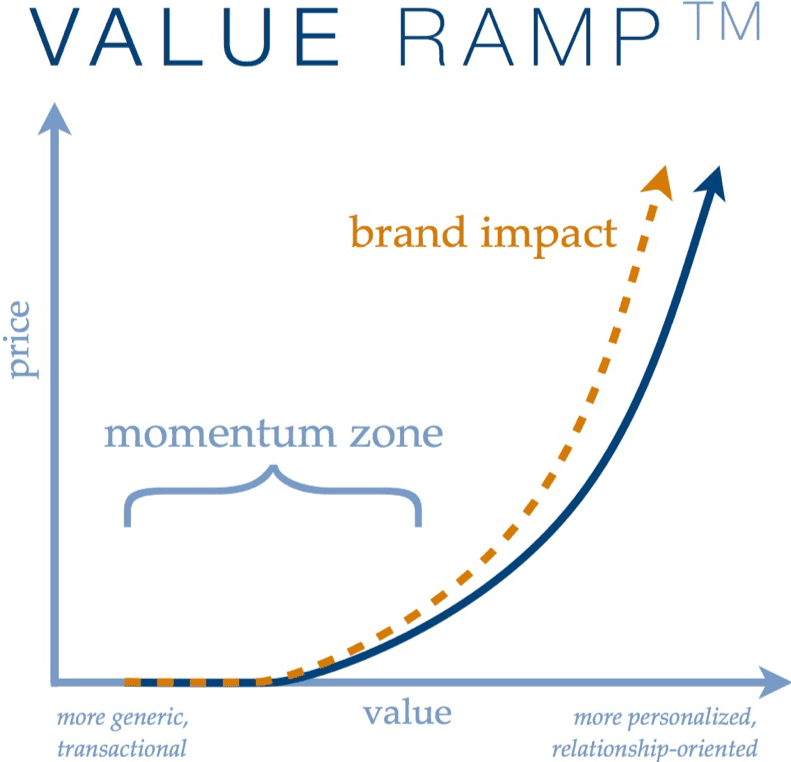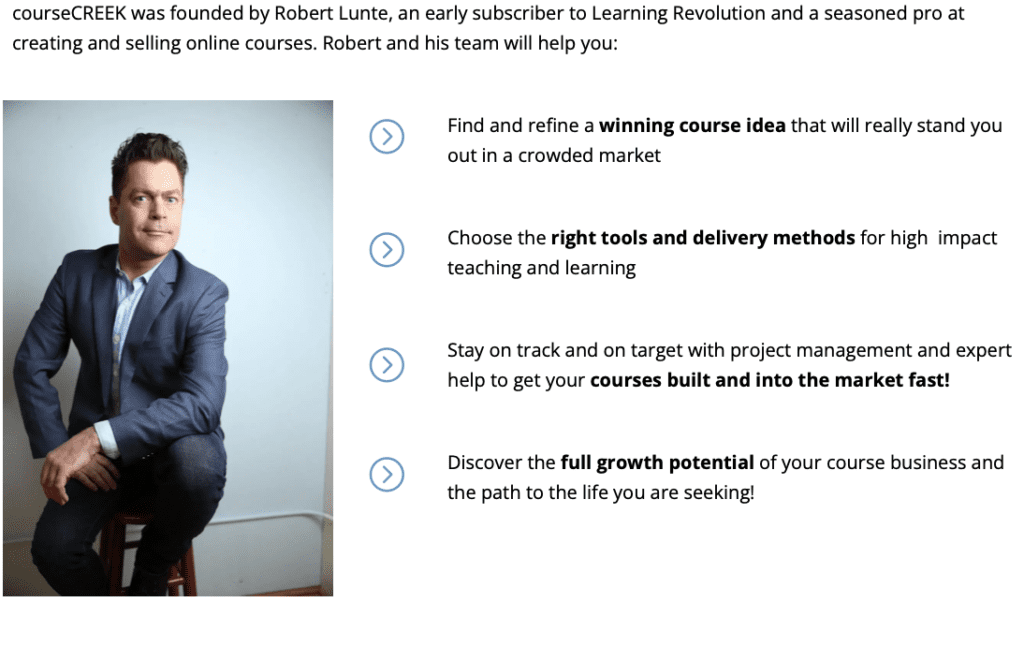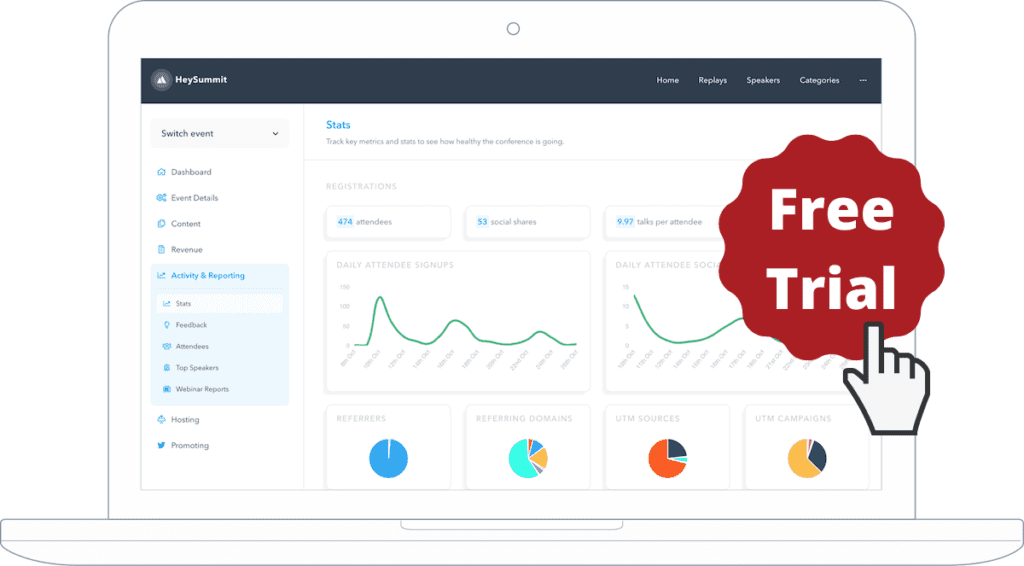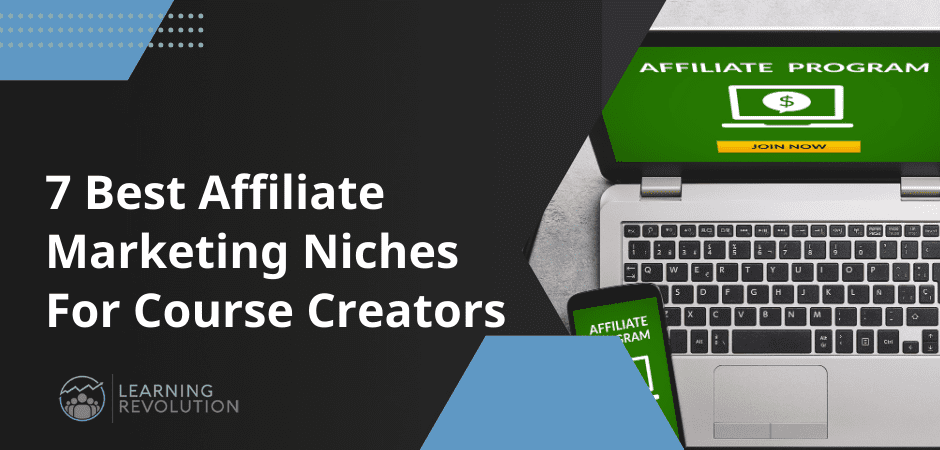

What are you an expert in? Maybe, like so many people who show up here on Learning Revolution, you have deep expertise in a profession or industry and are now looking for new ways to monetize your expertise.
Or, maybe you want to get started making money online but don’t think you have any transferable skills, much less any clue about how to monetize your expertise. You are in good company – one of the main factors holding people back from starting an expertise-based business is that they don’t see themselves as experts.
But the good news is that we are all experts in one way or another, and we don’t need a PhD to prove it. You might have a strong academic background that you can turn into an online business, but equally you might have gained experience through work, your hobbies, or life in general.
Even being a parent counts. For example, the popular YouTube channel Dad, how do I? offers DIY and life advice from a father’s perspective, and at the time of writing it has over 3 million subscribers (which translates into significant ad revenue). An accompanying “Dadvice” book is also in production.
YouTube and books may not be the right path for you, but the point is that there are many options to sell your expertise online. I’ve got experience with pretty much all of them at this point in my career, so in this article I’ll take you on a tour of the options for how to make money on the Internet and get you on track for monetizing your expertise.
Find your expertise
First things first. Often the problem facing a new creator or edupreneur isn’t gaining expertise, but clearly identifying the areas where you’re already an expert and figuring out how to position yourself. If that’s not you, feel free but jump ahead, but otherwise, begin by making a list of the subject areas you are knowledgeable about — that you could, with a little effort, create 100 blog posts or videos to discuss. Areas to look include your:
- Education
- Work
- Hobbies
- Life experiences
If you have specific industry expertise, that’s an obvious area to capitalize on. But even if you don’t – or simply want to do something different – the possibilities are practically endless. Raising kids, cooking on a budget, traveling solo, maintaining a vehicle, renovating a property, keeping chickens, growing plants, extreme couponing — you name it, there’s somebody out there who wants to learn it. Once you start making a list, the number of useful skills you possess might surprise you. And most of them probably have the potential to help you make money online.
As you go through this process, consider not only how what you know that might be valuable to others, but also how motivated you are to teach it. Sometimes, even though we have expertise in a topic or skill, the idea of having to write and speak about it over a long period of time isn’t all that appealing. Again, can you imagine creating 100 blog posts or videos about it? This is an arbitrary number, of course, but it’s a good test for whether you’ll really be committed enough to turn your expertise into a business. (See also Hitting Your Strategic Sweet Spot with the 3M Model.)
And start thinking about how you will position yourself. That is, how will you present you and your business in a way that makes you feel new, fresh, different? This is actually one of the most critical aspects of your efforts to sell your expertise. Let’s face it, unless you are working in a very, very niche topic area (in which case your audience is small), there are going to be other people out there who have similar expertise, and some of them are bound to end up being your competitors. So, what’s unique about you and how can you start building a brand around that?
Turn your expertise into a business model
Once you’ve chosen a subject (or several) that you feel comfortable teaching others, it’s time to develop a business model. A business model unites the value you provide to a specific audience with a way of capturing revenue in return for that value. In plain English, it’s how you make money online.
That’s it. All you need to do is find a way to package and position your knowledge and then identify people willing to pay for it.
Of course, in practice running a business is rarely that simple, but that’s the foundation from which to begin. Any expertise can be monetized, and one of the great things about making money online is how many options there are to generate revenue, and how democratic the process is. Anyone can become an edupreneur provided they can find the right model for delivering their expertise.
A key part of that is connecting with an audience for what you plan to offer.
Find the path to payment
Before committing to a product or service, you should consider the audience you plan to target with your business model. Who are they, and where are you most likely to find them? Identifying your major target audience is essential because it will influence your positioning, the online presence you create, and where you host your content.
For example, dad advice on life and DIY appeals to a younger demographic who are living independently for the first time. According to Sprout Social, 91 percent of 18-29 year olds use YouTube, so it’s no surprise the Dad, how do I? channel uses that platform, or that it’s doing so well there.


Whatever audience you target, its average member should ideally have either disposable income or access to budget allocated for education (e.g. at a business). Obviously, targeting people with access to money to spend makes your job of monetization easier. Sounds like an obvious point, but too often expertise-based businesses don’t get clear enough about who will really makes the buying decision about their offerings.
And what if your learners are younger or less affluent – i.e., less likely to have access to funds to spend on learning? You can still monetize your offerings through less direct paths to payment like ad revenue, affiliate marketing, sponsorship, and other techniques (more on that later!), but the journey to success may be somewhat slower and will likely depend on attracting a larger audience. (Remember, Dad, how do I? guy has three million subscribers!)
Whoever your prospects are, they also need to have the time available to work with and learn from you. Often that means you need to help them make engaging with you a priority. Part of successful building a successful expertise-based business is demonstrating your value in advance so your prospects want to make time for your offerings. (This is the main reason that content marketing is so important if you want to sell your expertise online.)
Try to think of as many potential learners as you can. While having a primary target audience in mind is good practice, the more ways you can position and promote an offering – and the more paths to payment you can identify – the more successful it is likely to be.
Offer options for different budgets
While targeting learners with access to money is the clearest path to becoming financially successful as an edupreneur, there are many ways to getting paid, basically different options you can create along the path to payment. Having several tiers of products and services enables you to capture revenue from multiple streams and appeal to learners of varying financial means or at various points in their relationship with you. Possibilities include:
High-Revenue Per Transaction
- Corporate learning events
- Speaking engagements
- Seminars and masterclasses
- Exclusive mastermind group
- Project consulting
Medium Revenue Per Transaction
- On-demand courses
- Online Conferences
- As-needed coaching
- Sponsorships
Low Revenue Per Transaction
- Books (print or digital)
- Affiliate revenue
- Per minute/hour consulting
- Merchandise
- Membership sites
Keep in mind that many of these can options be offered online or face to face. Either way, you should charge based on the level of access your customers get to you and the level of value you provide. If a customer gets one-on-one time with you over an extended period and you are helping them transform their life or business, that’s a high offering whether you do it online of face-to-face.
Also keep in mind that these are just general guidelines. A membership site, for example, which is in the low revenue category above could easily move into medium or high revenue if it is the right type of offering for the right type of people. Everything comes down to who you are selling to, the value you provide, your positioning, and your brand.
Having options across a range of prices – including even some that are free lead magnets – will keep any initial barriers to engaging with you low, while also building momentum that leads to higher-priced purchases. This is the basis for what I call the Value Ramp – an approach that helps you clarify how you will provide value – and, of course, monetize your expertise – with prospective learners at different stages of their customer journey.


While your expertise-based business might be centered around a course that costs $2,000 per person or a $7,500 coaching program, it doesn’t pay to overlook the potential learners who are willing to pay for your products, but simply can’t afford – or aren’t quite ready for – your higher priced offerings. Condensing some of your knowledge into an ebook or webinar for a lower price can expand your earning potential by appealing to a wider range of learners while also building momentum for your other offerings.
15+ ways to monetize your expertise


So, what kind of business models can you use to make it all happen? Here’s our list of the most common models expertise-based businesses use to attract customers and expand their businesses. While we wouldn’t recommend doing everything at once, as your business grows it pays to diversify as much as possible – again, think in terms of a Value Ramp.
If you’re just starting out, pick two or three options that offer a range of prices and payment models, and use them to develop your business reputation. As your income grows, continue to add new revenue streams.
Project consulting
Consulting projects are probably the number one starting point for experts seeking to monetize their expertise. That’s because you simply know how to do what you do and, so long as you can find someone that needs whatever that is, you can probably land some sort of contract to get paid for your services. And yes, it is possible to do this entirely online – I have for years.
Of course, picking up a contract here or there to make ends meet is very different from building a vibrant, consistent consulting business that attracts customers and commands high fees. I’ve written much more about how to start and grow a consulting business in other places. The main point I’ll make here is that you should look at consulting as a sort of laboratory for growing your overall expertise-based business.
What do I mean?
When you consult directly with clients, you get an up-close understanding of the issues and challenges they are facing and what it really takes to overcome them. You continue to hone your own skills and knowledge and, as you build a client base, you also build a base of people who are willing to provide testimonials and referals.
The key is to do all of this consciously from the beginning; to recognize the powerful way that consulting can contribute to your business. I don’t think it’s any accident that even entrepreneurs who have built highly scaled, automated expertise-based business will often continue to do consulting – usually on a very limited, very high-fee basis. It’s a powerful way to stay connected to their market.
If you want to build a vibrant consulting business, be sure to see 3 Rules for Future-Facing Consultants and EAT to Build a Consulting Brand.
Time-Based Consulting
A variation of project-based consulting is time-based consulting. What I mean by this is not the typical charge-by-the hour type work. I’m not actually a fan of that for consulting. Rather what I mean is taking advantage of technology to be able to charge for very brief bursts of consulting – by the minute even – as needed by your audience. You can do this by using “expert networks” like Clarity.fm or CleverX that have platforms designed specifically for this purpose, or you can use popular scheduling apps like ScheduleOnce to charge for your time.
My bias for this approach is to make it a limited part of your overall strategy. Carve out dedicated times each week – maybe a two-hour block one morning and two-hour block one afternoon to handle multiple time zones – and limit appointments to only those times. Charge a high fee – at least $200 per hour – both to make it worth your time and to communicate the value of your time.
And remember, this type of consulting – similar to project-based – is an invaluable source of market knowledge. You basically get paid to learn about the types of challenges you can address with educational product offerings. Another big advantage of this approach is that there typically no tasks or traditional “deliverables” – e.g., reports, presentations – involved. The time you spend with the client and the advice you give are the deliverables.
Coaching
In many ways, coaching is a blend of the previous two items. You take the knowledge and experience you bring to consulting and blend it with an extended, time-based approach – usually in the form of weekly sessions – aligned to helping your clients achieve longer term goals. As with time-based consulting, tasks and deliverables are minimal. You provide structure for the engagement and prepare appropriately for sessions, but most of the work is really up to your client.
While most coaching tends to be one-on-one, you can also extend this approach to working with teams within a company or to groups of individuals who share similar circumstances and needs. The key to this approach is to ensure that all participants are committed to being coached individually and to supporting the progress of others in the group.
A variation on coaching that many experts overlook is paid mentoring. This is similar to individual coaching in that the client commits to engaging with you over time, but it is the client’s responsibility to decide when and why they need input from you. You simply respond to the client’s request for advice within whatever parameters you set (e.g., you may commit to return all calls within an hour, e-mails within two hours, etc.). While this can feel too open-ended, my experience is that most clients make requests pretty infrequently under this arrangement.
For expert guidance on establishing an online coaching business, see
How to Start and Online Coaching Business.
Mastermind Groups
Mastermind groups are often a first step toward truly scaling your ability to monetize your expertise. Similar to group coaching, you bring multiple individuals together, but with the idea that they will learn at least as much, if not more, from each other as they will from you. While your subject matter expertise is valuable in this model, your real value is in your ability to identify and recruit people who will contribute substantively to the group and to help spark and facilitate meaningful discussions among group members.
While all of that may sound easy on the surface, anyone who has tried it knows how difficult it can be – which is why a successful mastermind is typically a premium offering. To launch a successful mastermind, you are typically going to need to develop a segment of your audience that is truly committed to whatever your area of expertise is and is looking to take things to a new level. Inevitably, some of these people are going to be willing to pay for a combination of access to you and to peers who share their sense of purpose.
Some great things about masterminds are that, as with consulting and coaching, you will continue to learn a great deal as you facilitate them. Additionally, once you have one successful mastermind going, you can replicate it or create variations of it for different segments of your audience. Finally, a successful mastermind tends to turn at least some of the participants into evangelists for you and your brand, helping to fuel your ongoing success.
Live Courses and Seminars
For experts who aspire to be edupreneurs, transitioning from consulting, coaching, and facilitating to explicitly teaching is a natural move. Live educational offerings, whether you deliver them face-to-face or online, are usually the most attractive starting point because they tend to require less effort to develop than self-paced offerings. With the knowledge you already possess, a decent deck of slides, and either a classroom or a webinar platform, you are in business.
Of course, it’s more complicated than that to truly do it well, but you get the idea. Getting started is quite easy.
And there are other advantages to live courses and seminars.
For one, because your students have direct access to you in a live offering, the value is usually perceived as higher than in self-paced, on-demand courses – meaning you can typically charge quite a bit more for them.
You can also adapt on the fly and at low cost when you are teaching in a live environment. The real-time feedback you get from your students may lead you to spend more time on a topic or ditch it altogether. Or you can spontaneously try out different ways to make your point. You simply can’t make those kinds of adjustments on the fly with a course that is pre-recorded or pre-programmed.
Finally, because live courses allow for real-time feedback and adjustment, they are very powerful as a way to pilot a course that you may eventually want to turn into an on-demand offering. In fact, this kind of piloting is the number one way to avoid online course failure.
There are, of course, different ways to come at a live courses – including blending it with some on-demand elements or “asynchronous” elements like discussion forums. To go deeper on different live approaches, be sure to check out the following:
On-Demand Courses
A successful on-demand online course is the “holy grail” for many aspiring edupreneurs these days. After all, who doesn’t like the idea of capturing your knowledge in way that it can be sold again and again without any additional effort on your part? And there are plenty of potential customers out there – Udemy alone boasts 24 million learners and growing.
Clearly, the technical side of pulling this off has gotten much, much easier in recent years. There are now many great online course platforms for creating, hosting, and selling online courses, and if you already have content you’ve created for a book, a speech, or a face-to-face seminar, you have a strong starting point for creating an on-demand online course.
Some of the main things to keep in mind with this model are that (1) because it has gotten much easier to do, competition has grown a lot in recent years, and (2) this has led to higher expectations from prospective learners. Just recording some videos of yourself speaking and maybe throwing a quiz and worksheet or two will no longer cut it with a lot of audiences.
So, if you are going to venture into on-demand online courses, make sure you understand basic adult learning principles, that you take the time to design your course carefully, and that you pilot before investing too much in production.
Take those steps – and, of course, keep building your audience over time – and on-demand courses can become one of the most profitable ways to monetize your expertise – especially, in my opinion, if you tap into the market to sell online courses to businesses.
If you’ve been struggling to move your course business forward, find out more about the partnership we have with courseCREEK to give you the expert, hands-on guidance you need to succeed.


Virtual Conferences
If you are a solo expert or part of a small business, you may not have even considered hosting a conference as a way to monetize your expertise. It may seem like something only large organizations and businesses do. But really, there is no good reason that you can’t host a conference – especially a virtual conference – and there are good reasons you should.
First, if you pull it off, you’ll have an educational offering that can be repeated year over year. It will keep producing revenue and, if you go about it the right way, it will become an asset – meaning something you could actually sell to someone else someday. (That’s monetization with a multiplier!)
Next, the great thing about a conference is that you usually leverage other people to produce and deliver much of the content. Better yet, you can often get these people to provide content at no charge in exchange for the opportunity you give them to connect with prospective customers.
And back to that earlier mention of virtual conferences: the pandemic has made them mainstream. The main knock against hosting a conference, historically, is that you have to deal with finding a venue, negotiating food and beverage contracts, and other hassles. The virtual approach gets rid of all of that, and with the platforms that are now available – like, for example, HeySummit you can put together a really compelling online event.


Membership Sites
In a way, membership sites blend together many, if not all of the approaches already covered. While some memberships are really just subscriptions – i.e., a way to access your online courses and other content on an ongoing basis – the ones that capitalize the most on your expertise tend to also allow for some level of access to you as an advisor as well as to facilitated interactions between peers in the community – a sort of highly scaled mastermind group. They also often featured access to a steady stream of guest experts – kind of like an extended online conference. And, of course, as you build a membership base, these people become the perfect candidates for attending a conference, whether online or face-to-face.
Technically, a membership site – especially one with a true community aspect to it – can be a bigger lift than many of the other options above, but as with virtual conferences, there are starting to be very good options even for solopreneurs. Check out membership site platforms like Mighty Networks or Circle.so, for example, that give you pretty much everything thing you need to create a vibrant online community where you can also host and sell online courses.
Check out The Complete Guide to Building a Successful Membership Site.
Speaking
Speaking at industry conferences and other events in your niche is great way to build your audience and your brand, but it’s also one of the most time-tested ways to monetize your expertise. The main rub with this one is that to make any real money, you are typically going to need to be speaking at the keynote or general session level. That’s where you can land four figure – and, as you build a reputation – five figure speaking fees.
To get to that level of speaking usually takes time, but the good news is that just about everything else you do to build your expertise-based business – from refining and shaping your content into courses, to building an audience, to consistent content marketing – will help you along the path to generating revenue as a speaker.
None of this is to say that you should avoid smaller or more specialized opportunities. If your expertise is in an unusual, but highly valuable knowledge area – say, some arcane aspect of financial management, for example – it’s very likely you can find receptive audiences and command strong fees right out of the gate.
And, of course, timing can help a lot. A 90+ minute presentation by a Midwestern town’s emergency planner, for example, has attracted over 180,000 views on YouTube. Why? Well, the planner is a good speaker, but his speech is also focused on a multi-vortex EF-5 tornado that ripped through Joplin, MO several years ago. With the growing interest in managing extreme weather events, this is a niche topic with the ability to attract a large audience.
If you want to boost your chances of getting in front of audiences for speaking engagements, you may want to consider getting an account on a site like eSpeakers, which maintains a marketplace for organizations searching for speakers. You should also identify any associations or other organizations in your niche that host events and actively contact them about speaking opportunities. (The AssociationExecs database can be useful for identifying association contacts at trade and professional associations.)
Finally, keep in mind that the global pandemic has really disrupted the professional speaking industry because it has disrupted the conference and events industry. In some ways, this disruption has made speaking more difficult as a path to monetization, but in other ways it has opened up new opportunities. As mentioned before, virtual conferences have now gone mainstream, meaning the opportunity to earn speaking fees without having to get on a plane is higher than it has ever been.
Books
With the advent of ebooks, sometimes it seems that everybody’s an author. Well, there’s a good reason for that: it has never been faster, cheaper, or easier to create and sell your own book through major retailers such as Amazon or Barnes and Noble. Turning your knowledge into a book can provide long-term royalty income with unlimited potential.
Print books typically earn authors less than ebooks because of the cost of manufacturing, but Amazon provides a service to create and distribute print books alongside ebooks, democratizing the publishing process. In most cases, having both a print and an ebook version is the way to go.
Keep in mind, too, that you can often negotiate a bulk purchase of your book as part of a speaking contract. Similar to selling online courses to businesses, this is one of the fastest paths to selling your books at a higher volume.
Explore ebooks in much more detail, see How to Write and Publish an Ebook.
Research
Depending on your area of knowledge and experience, producing original research can be a very lucrative way to monetize your expertise. To explore this possibility, ask a couple of key questions:
- What information that is not currently available (or easily available) would be very valuable to the audience I target?
- Aside from anyone who competes with my business, who cares about reaching and/or understanding my audience?
There is almost certainly information your target audience would like to have that is either not available at all or is very hard to find. There is usually at least some portion of this information you could gather through some combination of web-based research, conducting interviews, or running a survey.
This is information you can gather through research. Once you synthesize it and compile it into a nicely formatted report, you have at least a couple of choices.
First, you can sell it directly to members of your audience and/or people who care about understanding your audience. In that second camp are groups like investment firms or companies that want to do business in your market. Research reports that cater to those groups can sell for thousands of dollars per copy.
Another route is to find one or more sponsors for the report. If there are vendors who value getting in front of your audience, this may not be all that difficult to do. This is a route we have taken at my Tagoras, where we have published sponsored research – like the virtual conference report and conquering the confusion – for many years.
Newsletters
Think of a newsletter like a turbocharged blog. Instead of posting your content online where anyone — or no one — might read it, you’re delivering your content directly to the people who are most interested in hearing from you. Newsletters have higher engagement rates than blog posts and they put you at a significant advantage when you’re looking to convert interested followers into paying learners.
With the emergence of platforms like Substack, subscription newsletters enjoying a surge in popularity. Substack provides you with tools for managing an e-mail list, publishing your content, and collecting subscription fees. It even provides tools for building community with your subscribers.
Keep in mind that newsletters don’t have to feature all original content. In fact, “curating” content from a range of sources can be a very successful approach. With information overload being a widespread issue, prospective readers are often eager to find an expert who can identify and share the best content in a specific topic or to address a particular need. While I haven’t started charging for it (yet) this is the approach I take with the Learning Revolution and Leading Learning newsletters.
Of course, any newsletter is only going to be as successful as the list behind it. So, be sure to learn more about building your e-mail list..
YouTube
If you want to amass a following online, YouTube is the number one platform for reaching almost every demographic. (Not Instagram, not Clubhouse.)
Over 70 percent of all American adults use YouTube to watch videos, making it more popular than Instagram, Twitter, and even Facebook. In fact, the only demographic of YouTube users that falls before 50 percent is over 65s. No matter your learners’ gender, education, or location, there’s a better than average chance they’re YouTube users.
YouTube videos are great for edupreneurs because they are the perfect medium for teaching. Video lessons can also be an important part of any online courses you create and repurposing them for YouTube is simple and opens a whole new revenue stream (through ads), capturing learners who are interested in your subject but can’t afford to pay for access to a complete course.
Check out our guide to creating a simple home video studio to see how you can build a video recording setup quickly and cheaply.
Learn How to Make Money on YouTube | 10 Proven Strategies.
Podcasting
If video isn’t your thing, then consider podcasting instead. Is podcasting worth it in 2022? In my opinion, yes!
Podcasting is rapidly growing in popularity, but it is still new enough that edupreneurs can quickly rise to become the go-to authority in their specific niche without having to compete with millions of other content creators.
You don’t need a lot of podcasting equipment to get started, and there are numerous ways of monetizing your content. Personally, I’m a fan of the sponsorship route – it’s what we do over on the Leading Learning Podcast – but you can explore a range of podcast monetization options.
Keep in mind, too, that even if you don’t monetize your expertise directly through your podcast, it can be a powerful form of content marketing that drives revenue through other channels.
Discover the The Top 7 Ways To Monetize A Podcast.
Blogging
Anyone who aims to make money online should have a website, and for that website to really earn its keep, it should have a blog. It’s that simple.
Blogging may not feel like a direct path to revenue, but it is the foundation for just about every other revenue stream in this post because it is usually the main way you can build a body of content that showcases your expertise and attracts people to you. You aren’t going to land many consulting gigs, sell many courses, or book many speaking engagements, after all, if people can’t find you and easily discover the value you offer.
A strong blog is also the main path to being able to monetize your expertise passively – a key goal for many experts. Leveraged in combination with the affiliate revenue model highlighted below, a blog can continually drive traffic to sites that pay you a commission whenever the visitors you send convert into customers.
As an expert in your topic or field, you are particularly well positioned to “curate” – there’s that word again – the products and services that are likely to be the most useful to your audience. Publish a steady stream of “how to” posts and reviews of products relevant to the “how tos” and you can get on a path to generating thousands of dollars a month. (I’m not just blowing smoke here – this is exactly what I do at Learning Revolution.)
The great thing about blogging is that it is incredibly easy to get started.
BlueHost, one of the largest web hosting providers, offers hosting starting at $2.95 per month and a free domain for the first year. That’s a business expense any edupreneur can cover. I recommend starting with a simple WordPress site. There are thousands of free templates you can use to design your website and start creating content. Check out our top 10 content marketing tips for ideas about what to write.
For more on blogging, see How to Make Money Blogging.
Building an audience around a website takes time, but it gives your online business a home base where learners always know they can find you. Social media sites come and go, and online course hosting platforms, ebook retailers, and other networks won’t be around forever. Establishing your website early on protects your business by centering it around an asset that only you control.
Merch and Related Products
It’s a rare edupreneur who can sell T-shirts with their name on them, but that doesn’t mean you can’t earn income from selling products. Thanks to print on demand technology, it costs nothing to create designs and offer them for sale. You only pay for manufacturing once the sale has been made, and it is taken directly out of the purchase price, leaving you with nothing but profit.
You can use this technology to cheaply print branded products (pens, notebooks, mugs) for distribution at seminars or speaking engagements, but you can also offer related products with more mass appeal. For example, if you teach a course on how to fish, you could create a range of fishing-related merchandise. Sites such as enable edupreneurs to hire graphic designers at low rates, meaning you can quickly create massive product lines at very little cost.
You can also create digital downloads for sale to learners and other interested parties. Cheat sheets, templates, swipe files, white papers, and more can all be marketed and bring in a surprising amount of revenue. You can also use these products as tripwires to kick start your sales funnel. Do you use Excel or Word templates, or other specialist software? Even people with plenty of experience in your niche will see the value in purchasing a ready-made template that can make their lives easier. Any kind of tool you can build to make practicing your expertise easier is something learners would be interested in purchasing.
Finally, you can also create products using your expertise, if relevant. Edupreneurs working in creative fields can offer the results of their work for sale either digitally or as limited edition physical products. Even if you’re not an artist or musician, you can create digital offerings such as swipe files and worksheets that hold value for people interested in your field.
Examples of products and merchandise include:
- POD T-shirts, mugs, pens, and more
- Your photographs as digital wallpapers or framed prints
- Recordings of your music
- A PDF guide to best practices for your industry in the coming year
- An Excel spreadsheet template designed to help learners analyze data
Software
Software is a special class of product that deserves calling out on its own, if only because it could evolve into the main focus of your expertise-based business.
When you have strong expertise in a particular niche, you are no doubt aware of some of the key needs of your audience that could be supported with a software-based approach. Often these are processes that could be made much faster, more scalable, or just plain easier with the right program to help out.
Neil Patel – an expert in SEO – has done this, for example, with Ubersuggest.
Pat Flynn – one of the original entrepreneurial podcasters – has done it with Fusebox (formerly Smart Podcast Player).
Brian Clark basically turned Copyblogger – a site that originally showcased his copywriting expertise – into a seven-figure business by creating StudioPress and Rainmaker (both of which have now been sold, netting Clark and his partners a significant profit).
Of course, creating and selling software is usually a whole different level of business than consulting or creating courses, but there are interesting options for jumpstarting the opportunity – like, for example, IndieMaker, where you can find and buy existing software projects that are a fit for your niche. Even if you currently have no plans to pursue software, I recommend signing up for notifications from IndieMaker. You never know what might come along.
Top ways to make money online


Now you know some of the business models you can use to monetize your expertise and make money on the Internet, let’s look at the top revenue models that go with those business models. By combining different approaches to sharing your expertise with a variety of ways of earning money, you can diversify your income and increase your overall earnings.
Revenue models are typically split into active income, where your income is directly related to an action you take, and passive income, which is an ongoing revenue stream that earns money with little to no input from you.
Here are the top 10 ways to earn both active and passive income as part of your online educational business.
1. One-time payments
One-time payments are likely to be among the more common income sources for edupreneurs. For example, purchasing a ticket for a seminar or webinar, or buying access to a complete series of educational videos, would constitute a one-time payment. Prices for these products are usually set at a premium, thus they generate a smaller number of high value purchases.
Examples of one-time payment events include:
- Seminars/webinars
- Speaking engagements
- Project consulting
- Self-paced online courses
2. Ongoing subscriptions
Subscription-based revenue generates a small amount of revenue per learner per payment period but can contribute the majority of an edupreneur’s revenue if you have many subscribers. This revenue model is popular with many educators because it provides a predictable, recurring income amount each month and isn’t priced too prohibitively for new learners, making it easier to convince people to buy.
Examples of ongoing subscription revenue models include:
- Patreon accounts
- Newsletter subscriptions
- Video or podcast subscriptions
- Membership websites
A variation on this model is that you may be able to benefit from people accessing your content through subscriptions they pay for from other providers. You can publish your writing on Medium, for example, and earn revenue when your articles are read by their paid subscribers.
3. Fixed term recurring payments
Think of this model as subscriptions with an end date. While the subscription model is hugely popular, continually creating content for new subscribers might not be the most effective use of your time. Fixed term subscription products are easier to put together and can make money indefinitely if you bring in a continuous stream of new subscribers. The downside is the subscription has an end date, meaning you have to continue marketing the products in order to keep generating income.
Examples of fixed term recurring income models include:
- A coaching contract or consulting retainer
- A limited time mastermind group
- Time-limited access to conference content
4. Sponsorship
Getting a sponsor is a great way of earning additional income for products you are already creating. Sponsors can cover your production costs, add value to your courses or speaking engagements, or provide indirect financing by supplying the equipment you need to teach. Almost any educational product can have a sponsor, from YouTube videos and podcasts to seminars and speaking engagements. Pitch sponsorship deals to relevant industries, local businesses, and any company whose target audience overlaps with your learners’ demographics.
Examples of sponsorship opportunities include:
- Display information in your seminar program or online conference from relevant businesses
- A local catering business supplying the food for a speaking engagement
- A company paying a fixed rate for each of your YouTube videos in exchange for their logo on the content
- A video equipment manufacturer providing the camera and mic for your studio
5. Royalties
Royalties are paid as a percentage of net profits on copyrighted works. Many edupreneurs self-publish books through Amazon and other major retailers, gaining fast, easy access to a massive worldwide audience. A $9.99 ebook published through Amazon will earn the author up to $6.99 in royalties (70 percent), meaning even a modest number of sales can quickly become a significant revenue stream. Successful edupreneurs can make tens of thousands of dollars each month through ebooks alone.
Examples of ways edupreneurs earn royalty income include:
- Publishing ebooks and physical books through Amazon
- Publishing audiobooks through Audible
- Uploading stock photography to Alamy
- Streaming your music or podcast through Spotify
6. Ad revenue
If you choose to publish content online, numerous platforms allow you to generate income through ad revenue. Sites such as YouTube offer ad revenue splitting for popular content creators, and you can host ad networks on your website and get paid for views or clicks. The more popular your content, the higher premium you can command from ad networks, but even edupreneurs at the start of their journey to create an online business can earn extra income through displaying ads. You can also sell ad space on your website or course materials directly to businesses to earn a better rate.
Examples of ad income models include:
- Using a service on your website to display ads to visitors
- Enabling ads before and/or during YouTube videos
- Selling ad space in your handouts and programs
- Promoting businesses through your podcast or videos
7. Affiliate revenue
Affiliate income can be big business. The way affiliate revenue works, if you refer a buyer to a product, you get a cut of the sale price. Sites like Amazon have extensive affiliate programs, and many even offer to pay a cut of any purchase that comes from your referral link. That means if you refer your $10 book in hopes of earning a 5 percent affiliate cut ($0.50) but the person who clicks the link decides against the book and instead buys a new $1000 computer, you earn 5 percent on the computer ($50).
Although Amazon is the obvious player in this field, they’re not the only affiliate network out there. If you teach a subject that uses specialist equipment or software, check out major industry retailers to see if they offer affiliate programs. Sign up for ones associated with products you know can be valuable for your audience. You can also search for good product opportunities on major affiliate networks like:
As already mentioned, one of the keys to being a successful affiliate marketer is to become a trusted “curator” of products that are truly relevant and useful to your audience. This doesn’t mean you have to use every product you highlight – often that would be impractical or impossible – but it does mean you need to take time to vet the products and the company to make sure you think they are of high quality.


To really drive significant traffic to affiliate partners, you will need to weave mentions of affiliate products into situations where they are relevant – for example in the context of “how to” posts where the affiliate product can be of help with accomplishing whatever task you are talking about. Additionally, it helps to publish focused reviews of your major affiliate products to provide useful information to your audience and also to attract new prospects who may be searching for information on the product.
For more on affiliate marketing, see A Guide to Expert-Curated Affiliate Marketing.
8. Donations
The last revenue model on my list is one that might make some educators nervous. Isn’t asking for donations the same as begging? Well of course not. If you create content online for free through social media or your website, including a tip jar is a good way to generate a little extra revenue from people who have enjoyed the content and want to give back. It doesn’t have to be obtrusive, and readers can choose to leave a tip or not as they see fit. In a world of ads and paywalls, many learners are willing to reward websites that make browsing experiences easier.
No, a tip jar won’t make you rich (usually), but it can generate a reasonable amount of ongoing revenue, particularly if you work in a niche where audience members are likely to be prone to donating.
Along these lines, if you haven’t heard of Patreon yet, you’re missing out. Patreon provides a gated community for artists, creators, and edupreneurs to build a community around their content. With their monthly subscription option, members get ongoing access for a set fee each month, stabilizing your income. Or if you don’t want to add more work to your day by creating regular content, choose a per project payment model and your subscribers are only billed when you upload new content.
Final thoughts
Starting an online business to monetize your expertise can be daunting, but it’s never been easier to begin. You can select any niche where you have experience and a passion to educate others, and start teaching using the methods that most appeal to you, be it video classes, online courses, written articles, or in-person lectures and seminars.
Because there are so many available options, some entrepreneurs make the mistake of spreading themselves too thin. You are much more likely to achieve success with one or two primary teaching methods than trying to do everything at once. As your reputation as an expertise-based business begins to grow, you can branch out to offer new models or products.
For example, you could begin by creating a $495 online course and supplement it with YouTube videos that repurpose the course content. This maximizes your reach and diversifies your revenue without creating a huge amount of extra work you have to do upfront.
More and more people are looking for help in navigating our complex, fast-paced world. That may mean seeking out expert advice and connections. It may mean continuing their education, taking up a new hobby, or developing skills to help them get ahead. Whatever your expertise, there is somebody who wants to learn what you know and that makes for a great opportunity to make money online.
See also:
- How to Start a YouTube Channel and Grow It
- 12 Ways To Make Money With Live Streaming
- 19 Best E-Learning Affiliate Programs You Should Promote
Table of Contents



